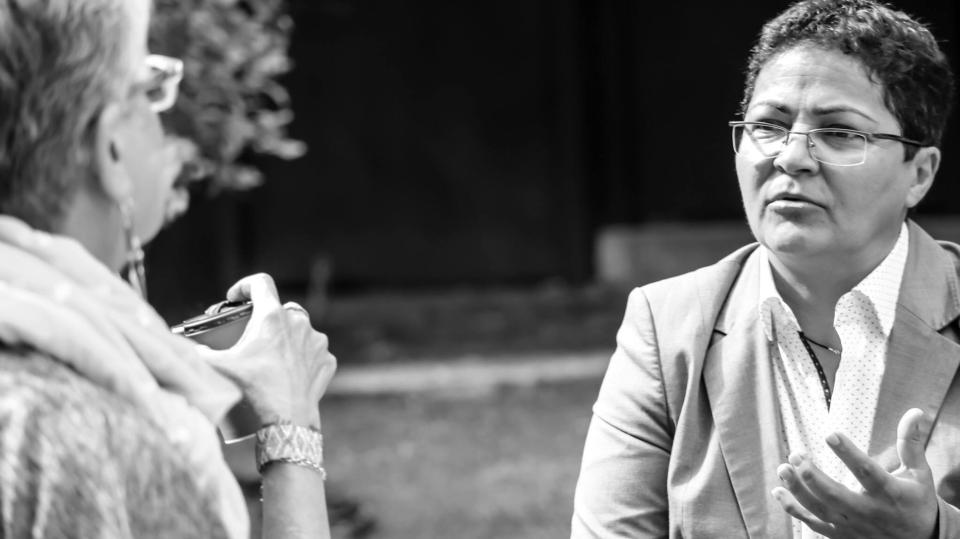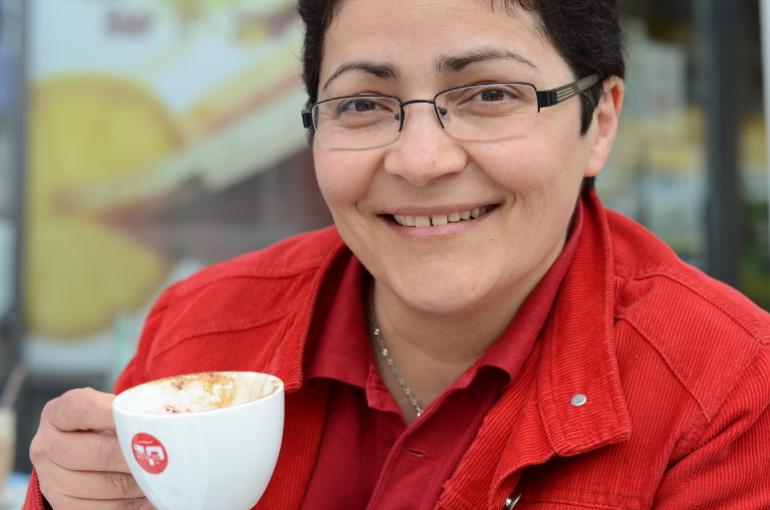
Image description: Black and white photo of Shadi Amin talking to another person. Photo taken by Shahrzad Arshadi
In June 2015, an organized online defamation campaign began against Iranian queer feminist and writer, Shadi Amin. A website claimed that Amin had perpetrated rape, abuse, bullying and money laundering.
The website was accompanied by a Facebook page, a Twitter account and an Instagram account, all of which replicated its claims that Amin was guilty of “documented cases of verbal, physical and sexual violation”, that she was corrupt, that she was a homophobe, “anti-male”, and had engaged in an abusive relationship with a “vulnerable refugee” in what constituted an act of “emotional rape.”
The attackers spread these articles about Amin on social media through a number of fake Facebook pages, and emailed them to spaces such as Amnesty International and the BBC.
Amin, who had to leave Iran in 1983 and lives in exile in Germany, found her world turned upside down. She contacted several online platforms – the website host at domain.com, Wikipedia, and all the social networks involved – to find the identity of the person posting these articles. All of this was to no avail.
Finally, some friends helped Amin trace the website to another Iranian queer activist living in exile in Toronto, a man called Arsham Parsi. Parsi denied any involvement in the campaign, while, Amin says, the harassment continued unabated.
Amin sued for defamation in a Toronto court, and overwhelming evidence pointed to Parsi’s involvement in the campaign. In April 2018, the court found Parsi guilty of defamation and ordered him to pay her $25,000 in damages, in addition to court costs and interest. However, the website and a few Facebook accounts belonging to the attackers continue to remain active, and the other perpetrators remain unknown.
In April 2018, the court found Parsi guilty of defamation and ordered him to pay her $25,000 in damages, in addition to court costs and interest.
A year later, Amin spoke about her ordeal at re-conference, a feminist gathering organized by the non-profit organization CREA in Kathmandu. The defamation continues to impact Amin’s life in myriad ways. As a whole, what happened to Amin is still largely ignored within activist communities, especially when the perpetrators are other people who publicly identify as activists.
In an interview with GenderIT, Amin spoke about the consequences of this defamation on her life, and the cost of ignoring this all too prevalent form of online violence.
Excerpts from the conversation:
Shreya Ila Anasuya (SIA): Can you describe the impact of the defamation campaign on your personal and professional life?
Shadi Amin(SA): I believe that my life can be divided into before and after these attacks. Something like this would change anyone’s life in a fundamental way.
Trust that was easily given before becomes hard to earn after. It becomes risky to talk about personal matters even to your friends. Words that you once used on a daily basis become things you have to consider before they can be said out loud, because they can be twisted against you.
I used to perform stand-up comedy, and the most significant impact that the defamation campaign had on me was that I had to put this aside. Seeing people laugh or not laugh, these were both difficult for me. I wouldn’t know whether one of the attackers was in the crowd. Performing made me feel unsafe.
You have spoken elsewhere about how your feminist friends and allies reacted in the aftermath of the defamation. Can you tell us more about this experience?
One of the people who had a hand in the defamation campaign against me, and who was identified during the trial in Canada as one of the writers of articles accusing me of rape was accepted as a speaker by a feminist conference I’ve been working with for 24 years.
At first, we privately asked the organizers to remove this person from the programme. They declined our request. Then, over 130 feminists and academics signed a public statement supporting the recommendation that this person shouldn’t be invited as a speaker.
Some of my close friends, including people I’ve known for 20 or 30 years, who were involved in the organizing of the conference acted as their it was their homes or organizations that had been attacked. They were far more concerned about their conference, instead of defending me.
In the end, they told me they would have investigated the matter if I had filed another complaint in the country this person was based and got a separate judgement against her. By doing so, they set aside their feminist responsibilities.
They expected a victim of violence to create a safe space for themselves only through the law, which takes a considerable emotional and financial toll. But they were more worried about having to take a stand because it made them uncomfortable. So they took the easiest path, of turning a blind eye.
They expected a victim of violence to create a safe space for themselves only through the law, which takes a considerable emotional and financial toll.
“I don’t know” and “I can’t judge” were the magical sentences that rescued them and made me feel more agitated. It wasn’t enough for them to read the transcripts and the verdict of the Canadian court which though was against someone else, provided enough evidence to prove this person’s involvement in the defamation campaign. Such a situation makes you lose your faith in feminism a bit.
After the court win, a lot of feminists had sent messages, and 160 feminists had commented on Facebook saying they were happy for me. But after this conference, so many of them backed out of supporting me. Some persons who had supported me earlier started to say yeah it was important but you now have to settle, now you shouldn’t continue this discussion.
For them it is finished. For me it is not finished. It’s alive everyday in my life. And for me, as a feminist person, I can’t accept this response – not from another feminist activist.
SIA: Defamation, even by people who are meant to be allies within same or allied movements, constitutes online violence. Do you think this is taken seriously as an issue within activist communities online?
SA: Unfortunately not, at least not as seriously as it should be. Especially within the LGBTI community, where there aren’t as many allies, and where people feel that talking about something like this will decrease allyship. When we do talk about these issue, we get blamed for what is seen as an act of positioning ourselves needlessly as victims, or washing our dirty linen in public.
This attitude makes it so difficult for someone to talk about their pain. It gives rise to a fear of being judged wrongly, or of pain being perceived as weakness. This isolates victims of defamation from talking about what they’re going through to allies, even from the same community. As you can see, this is a complicated issue and very different to voice in the outside world.
With this sort of violence, we cannot defend ourselves. Online defamation is happening on platforms owned by large companies whose main motive is profit – they often entirely ignore victims, or don’t support them properly. Our allies really have to educate themselves about how to support victims of cyber-violence.

Image description: Shadi Amin holding coffee cup. Image source: Shadi Amin
SIA: Since you have shared your experience, have other activists come forward with their own stories of online defamation?
SA: Yes. Around the time of the conference I mentioned earlier, many came forward and said they had also suffered this sort of violence, but they hadn’t seen it as harassment until then.
And it also changed people’s perception of who can perpetrate this violence. After we discussed it, one of my friends realized the perpetrator was a gay man. They said they realized someone’s sexual orientation or gender identity doesn’t necessarily make them incapable of spreading defamation or attacking someone’s reputation.
How did you feel after winning the lawsuit that held Parsi liable for defamation? Did winning the lawsuit change things for the better?
I received the email with the verdict at midnight. I couldn’t contain my joy but at the same time, I cried hard. It was so bitter that even to this day when I’m writing this, I can feel the tears. You feel like what was the point? Did I do all this to prove I’m innocent? You feel like you needed to fight for years just to have a normal life. For your personal life. For your own affirmation. I suddenly felt the futility of this fight. I hadn’t won easily and without struggling.
You feel like you needed to fight for years just to have a normal life. For your personal life. For your own affirmation. I suddenly felt the futility of this fight.
But today I feel like I needed the verdict. So did society. For example, I had a meeting with an official human rights commission a while ago. I saw that they had a copy of my Wikipedia page and some defamatory articles with them. It showed that when they’d searched me, this is what had come up. I told them that I know they’d done research on me. At first, they weren’t happy that I recognized what was in their files. I told them if they search harder, they’ll find the court ruling.
At this point, I feel like this is why I need this court verdict – to back me up in situations where people don’t know me and their only source of information is Google.
SIA: How can we take malicious online defamation more seriously, and support activists who are going through this experience?
SA: I think the most important thing is hearing people’s stories. Talking about the dry theory of cyber-violence and ways of fighting against it won’t help our case.
We need to show that the receivers of such threats and violence are human. We need to make the invisible wounds on our bodies visible. We need to create empathy between society and the victims, and we need to emphasize the importance of keeping away from such destructive activities online.
We need to teach people how to empathize with the victims and stand against the sentence: “You aren’t alone so don’t stress over it too much.” We need to stop ourselves before saying this sentence. We need to take these attacks seriously. This can only be done through emphasis, education, people’s stories and experiences.
SIA: How do you feel about social media as a site for activism following this experience? Especially since none of the major companies, including Facebook, took any action against the defamation you faced?
SA: For a time, it was terrifying for me to go on Facebook or Instagram, or even Google my name. It made me very worried and frustrated. It made me despise the world of technology. Unfortunately, these days social media has become one of our important tools of communication. It’s impossible to imagine activism without it. But it is also a tool that attackers continue to use. We need to create feminist platforms, and fight against the marginalization of LGBTI communities online. This is challenging, but much needed.
Digital rights activists have long pointed out the exploitative nature of tech giants such as Google, Facebook and Twitter. We have many experiences where breaches of privacy and consent are not taken seriously by any of these platforms –– yet in policy spaces and in public statements they repeatedly claim to be committed to human rights values. How can we hold these companies accountable for the violence they enable?
I think there need to be supervisory commissions on these platforms. Investigators need to be able to contact these platforms. In the end, there needs to be more serious mechanisms against organized hate, such as in my case. Google still hasn’t taken any steps to take these defamatory accusations down. This is the epitome of irresponsibility and in my opinion, it’s supporting illegal activity. Because as long as they are available, the criminals are still hurting me.
Digital rights activists have long pointed out the exploitative nature of tech giants such as Google, Facebook and Twitter. We have many experiences where breaches of privacy and consent are not taken seriously by any of these platforms.
- 6452 views






Add new comment